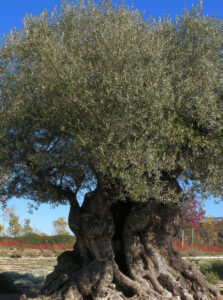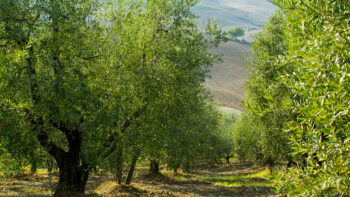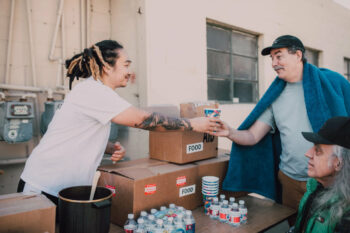You Plant the Olive Tree for your Grandchildren

By Fr Gerard Whiteford SM
 In the year 2013, I was fortunate to make a pilgrimage visiting many of the places St Paul went to as he preached the Good News. One of the frequent questions asked me on my return was, inevitably, “what was the highlight of your time away?” To name one was not easy, and so I asked myself, “What comes most immediately to mind? Maybe that is the highlight?” And what came most immediately to mind for me was not a place, rather a comment. The comment was made by one of our tour guides, and the comment made was, “you plant the olive tree for your grandchildren!”
In the year 2013, I was fortunate to make a pilgrimage visiting many of the places St Paul went to as he preached the Good News. One of the frequent questions asked me on my return was, inevitably, “what was the highlight of your time away?” To name one was not easy, and so I asked myself, “What comes most immediately to mind? Maybe that is the highlight?” And what came most immediately to mind for me was not a place, rather a comment. The comment was made by one of our tour guides, and the comment made was, “you plant the olive tree for your grandchildren!”
Olive trees are prolific throughout the countryside of Greece. Wherever one drives, one is not too far from the olive tree. There are major groves of the olive tree spread over many acres on each side of the road. They stretch for mile after mile. There are also small farms growing their own few trees.
The life cycle of the olive tree is fascinating. For the first seven years the tree is unproductive, it bears no fruit, or the little it produces is worthless. From years seven through to about thirty there is a constant increase in the tree’s productivity. Then from the years thirty-five to one hundred and fifty it reaches maturity and full production. An olive tree may then continue to produce fruit for another hundred years, sometimes more. By the look of the gnarled trunks of many of the olive trees seen throughout Greece, they have been there for many a year.
A feature in the planting of the olive grove is the spacing. Enough space is left between trees to enable a replacement tree to be planted. The picture is then of two well established trees providing protection for the growing tree, which in time will be the replacement tree for the older of the two (like in two hundred years’ time!)
As a Church and a diocese, and a faith community, with the responsibility of proclaiming God’s Word, maybe the image of the olive tree and the comment of our guide can give us cause to pause and reflect.
Is Pope Francis calling us to something old, and to something new. His decision on the night of his election, not to wear the red mozzetta over his white cassock. His keeping his black shoes and dispensing with the red papal loafers.
 The pope’s decision not to move into the grand papal apartments of the Apostolic Palace and instead continue residing at the Domus Sanctae Marthae, the Vatican’s version of a hoste
The pope’s decision not to move into the grand papal apartments of the Apostolic Palace and instead continue residing at the Domus Sanctae Marthae, the Vatican’s version of a hoste l. His choice to celebrate Mass with his co-workers each morning, and not in splendid isolation. The decision to celebrate Holy Thursday Mass at the Casal del Marmo, a prison for young people. One of the inmates reportedly told a social worker, “At last I shall get to meet someone who says he is my father!” His invitation to his ordained ministers to, “smell like the sheep!”.
l. His choice to celebrate Mass with his co-workers each morning, and not in splendid isolation. The decision to celebrate Holy Thursday Mass at the Casal del Marmo, a prison for young people. One of the inmates reportedly told a social worker, “At last I shall get to meet someone who says he is my father!” His invitation to his ordained ministers to, “smell like the sheep!”.
As Pope Francis invites us into something new, maybe the olive tree is the symbol for us to carry; we are being invited to plant something new for our mokopuna, our grandchildren. Our natural instinct is to consider ourselves and protect our own interests. That is fully understandable. However, our primary consideration should be for them.
As each diocese and parish struggles to return to normal after dealing with Covid-19 disruptions, I suggest we take time to pause and reflect on the learnings from our time in isolation and absence. Before we hurry to ‘reclaim the old ways’, which in fact we will not be able to do. We are a changed people, a changed faith community. We are individuals and a faith community who are experiencing a pandemic! That will change us forever.
In particular, has this occasion of absence caused me to look elsewhere for the Real presence of God? Not having the presence of God through the Sacrament of the Eucharist does not mean that God has disappeared! God cannot disappear! We, human persons have caused the separation, the division. God is ‘more present here than there’ is our doing not God’s. “God is one” the Penny Catechism taught me and others all those years ago. The word “Eucharist” is a transliteration of the Greek word eucharistia, which is itself a translation of the Hebrew word berekah. All three words have the meaning of thanksgiving. Have we dared look for God elsewhere and given thanks, in the changing of the seasons, as green turns to gold and yellow and rose red; in the affirming love of a parent or caregiver; in the spontaneous help of the medical staff in our hospitals; for the many food parcels both generously put together and delivered; in the standing together at our driveways to acknowledge those women and men who die protecting our freedom.
St Paul writing to the fledgling Church in Corinth wrote, “I did the planting, Apollos did the watering, but God made things grow. Neither the planter, nor the waterer matters: only God who makes things grow.” (1Corinthians 3: 6-7)
 Entries(RSS)
Entries(RSS)